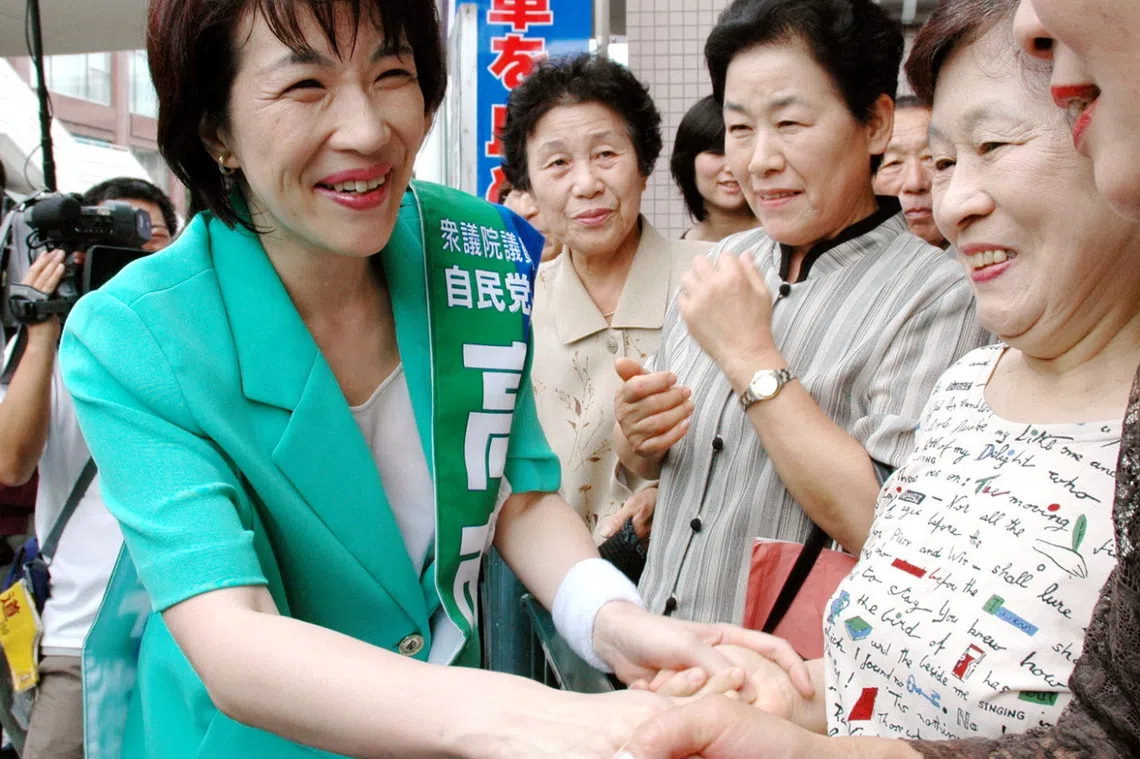In home town of Japan’s ‘Iron Lady’, supporters stress her softer side
Sign up now: Get insights on Asia's fast-moving developments

Those who know Ms Sanae Takaichi from her younger days believe she is well-prepared to solve Japan's issues.
PHOTO: REUTERS
Follow topic:
NARA - Ms Motoko Shimada fondly recalls when a classmate at her public school in the western Japanese city of Nara, Ms Sanae Takaichi, showed early signs of the leadership that would set her on course to become the country’s first female prime minister.
It was just before an important high school entrance exam, and Ms Shimada had forgotten her lunch, intensifying already jangling nerves.
“Let’s share mine,” a young Ms Takaichi gestured.
Another classmate, overhearing the offer, also came forward. “Thanks to that, I passed the high school entrance exam. I’m truly grateful,” recalled Ms Shimada.
The anecdote is one of several shared by Ms Takaichi’s hometown friends and supporters that render a softer side to the hardline conservative, who cites late British prime minister Margaret Thatcher, a divisive figure in British politics known as the “Iron Lady”, as her hero.
The selection of Ms Takaichi, 64, to lead the ruling Liberal Democratic Party
She was picked to rejuvenate a party that has lost control of both houses of Parliament in recent elections, with voters angry over rising living costs and drawn to opposition offering big stimulus and controls on foreigners.
As her party remains the largest, Ms Takaichi is expected to win approval for her premiership from Parliament later in October.
Her former hairdresser, Mr Yukitoshi Arai, believes she is well prepared to solve Japan’s problems and even her hairstyle – which he has dubbed the “Sanae Cut” – is designed to show she is paying attention to people.
“It has a sleek, sharp and stylish look. The sides are long, but she deliberately tucks them behind her ears as a way of showing that she listens carefully to other people,” said Mr Arai, who started cutting Ms Takaichi’s hair around 30 years ago.
Unlike Mrs Thatcher – known for her tough budgeting policies – Ms Takaichi has promised help to households via tax cuts and spending that have shaken investor confidence in the world’s fourth-largest economy.
“For Japanese people, our underlying problem is really the economy. There’s a strong desire for solid economic policies that make daily life more affordable and comfortable because everything is so expensive now,” said Mr Arai.
Nationalist with socially conservative views
At Ms Takaichi’s constituency office in Nara, where a massive mound of congratulatory flowers partially blocked the entrance, her school friend Ms Shimada said Ms Takaichi’s modest upbringing had instilled a strong work ethic.
Unlike the two lead male candidates she defeated in Oct 4’s race, who hail from powerful political families, Ms Takaichi’s mother was a local police officer and her father worked at a car company.
Her surroundings in the ancient city of Nara, where temples dot the skyline and sacred deer roam its park, also shaped her traditional values and nationalist pride, Ms Shimada said.
“I’m like (Takaichi) too – growing up with that kind of sentiment, and feeling proud of it. I believe that’s really the foundation of who she is,” she said.
That conservative appeal may help blunt the rise of Sanseito, a “Japanese First” anti-immigration party that broke into the political mainstream in a July election.
During her campaign, she pledged to crack down on rule-breaking visitors and immigrants, who have come to Japan in record numbers in recent years, and complained about tourists reportedly kicking Nara’s sacred deer
But even though she has smashed the glass ceiling like her idol Mrs Thatcher, her socially conservative views – such as opposing changes to allow married women to keep their surnames – mean she is unlikely to be a champion for women, said youth activist Momoko Nojo.
“She gained her position by accommodating the male-dominated society as much as possible,” said Ms Nojo. “We can’t expect much.” REUTERS

